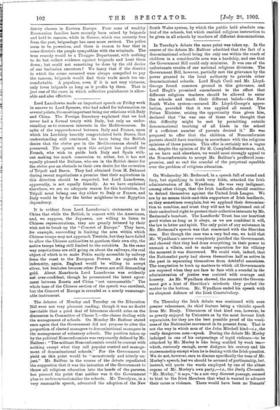On Thursday the Irish debate was continued with even greater
vehemence, its chief feature being a vitriolic speech from Mr. Healy. Utterances of that kind can, however, be as greatly enjoyed by Unionists as by the most fervent Irish separatists, for they are the best possible proof of the weak- ness of the Nationalist movement in its present form. That is not the way in which men of the John Mitchell kind—i.e., the really dangerous men—speak. During the debate Mr. Morley indulged in one of his outpourings of tepid violence—tO be attacked by Mr. Morley is like being scalded by weak tea— which, curiously enough, never disfigure his oratory and his statesmanship except when he is dealing with the Irish question. We do not, however, care to discuss specifically the tone of Mr. Morley's speech, lest we should be accused of partisanship, but, instead, will quote the words employed by one of the ablest organs of Mr. Morley's own party,—i.e., the Daily Chronicle. " Mr. Morley," it says, " In a not very discreet passage, seemed to hint to the Irish Members that what is wanted to advance their cause is violence. There would have been no Tenants' Charter, he said, without violence in Ireland. This is dangerous doctrine to preach at a time when a land agita- tion is once more on foot. Nor was Mr. Morley very well advised, we think, in declaring all schemes of gradual reform in Ireland to be futile. One must make allowances of course for a practitioner who has patented a heroic remedy and cannot readily bring himself to look at any other. But when Mr. Morley ridicules a policy of reform in Ireland step by step; has he really convinced himself that any other is practicable P " That seems to us a very well merited rebuke, and the Daily Chronicle deserves the highest credit for having the courage to administer it to one of its own party. The debate ended by the Government securing a majority of 61 in a thin House (196 to 135).







































 Previous page
Previous page